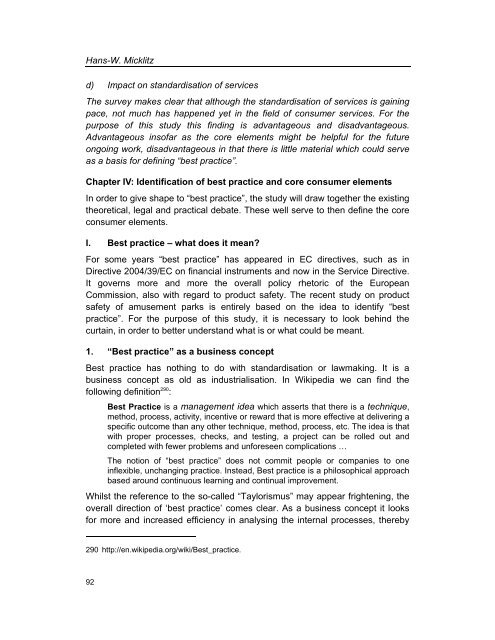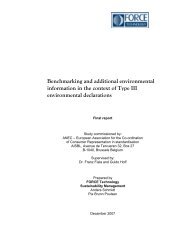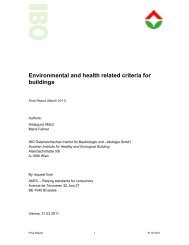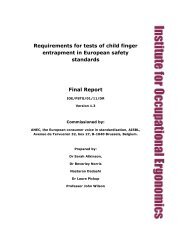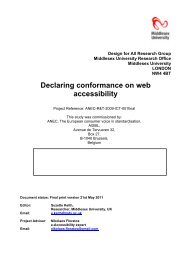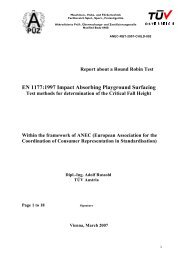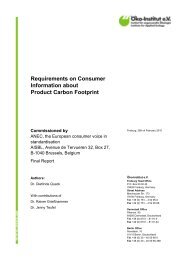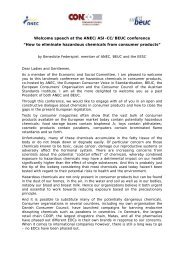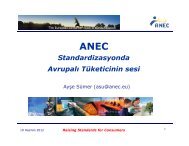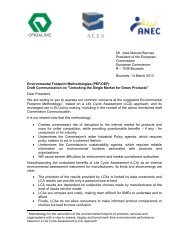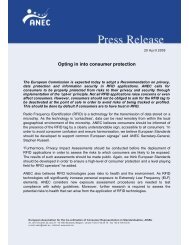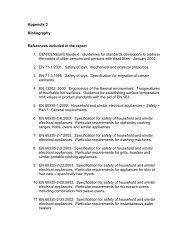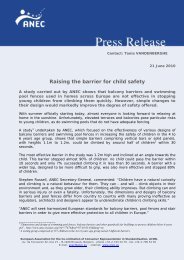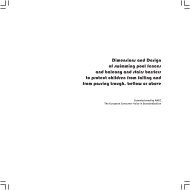Services Standards: Defining the Core Consumer Elements ... - ANEC
Services Standards: Defining the Core Consumer Elements ... - ANEC
Services Standards: Defining the Core Consumer Elements ... - ANEC
Create successful ePaper yourself
Turn your PDF publications into a flip-book with our unique Google optimized e-Paper software.
Hans-W. Micklitz<br />
d) Impact on standardisation of services<br />
The survey makes clear that although <strong>the</strong> standardisation of services is gaining<br />
pace, not much has happened yet in <strong>the</strong> field of consumer services. For <strong>the</strong><br />
purpose of this study this finding is advantageous and disadvantageous.<br />
Advantageous insofar as <strong>the</strong> core elements might be helpful for <strong>the</strong> future<br />
ongoing work, disadvantageous in that <strong>the</strong>re is little material which could serve<br />
as a basis for defining “best practice”.<br />
Chapter IV: Identification of best practice and core consumer elements<br />
In order to give shape to “best practice”, <strong>the</strong> study will draw toge<strong>the</strong>r <strong>the</strong> existing<br />
<strong>the</strong>oretical, legal and practical debate. These well serve to <strong>the</strong>n define <strong>the</strong> core<br />
consumer elements.<br />
I. Best practice – what does it mean?<br />
For some years “best practice” has appeared in EC directives, such as in<br />
Directive 2004/39/EC on financial instruments and now in <strong>the</strong> Service Directive.<br />
It governs more and more <strong>the</strong> overall policy rhetoric of <strong>the</strong> European<br />
Commission, also with regard to product safety. The recent study on product<br />
safety of amusement parks is entirely based on <strong>the</strong> idea to identify “best<br />
practice”. For <strong>the</strong> purpose of this study, it is necessary to look behind <strong>the</strong><br />
curtain, in order to better understand what is or what could be meant.<br />
1. “Best practice” as a business concept<br />
Best practice has nothing to do with standardisation or lawmaking. It is a<br />
business concept as old as industrialisation. In Wikipedia we can find <strong>the</strong><br />
following definition 290 :<br />
Best Practice is a management idea which asserts that <strong>the</strong>re is a technique,<br />
method, process, activity, incentive or reward that is more effective at delivering a<br />
specific outcome than any o<strong>the</strong>r technique, method, process, etc. The idea is that<br />
with proper processes, checks, and testing, a project can be rolled out and<br />
completed with fewer problems and unforeseen complications …<br />
The notion of “best practice” does not commit people or companies to one<br />
inflexible, unchanging practice. Instead, Best practice is a philosophical approach<br />
based around continuous learning and continual improvement.<br />
Whilst <strong>the</strong> reference to <strong>the</strong> so-called “Taylorismus” may appear frightening, <strong>the</strong><br />
overall direction of ‘best practice’ comes clear. As a business concept it looks<br />
for more and increased efficiency in analysing <strong>the</strong> internal processes, <strong>the</strong>reby<br />
290 http://en.wikipedia.org/wiki/Best_practice.<br />
92


